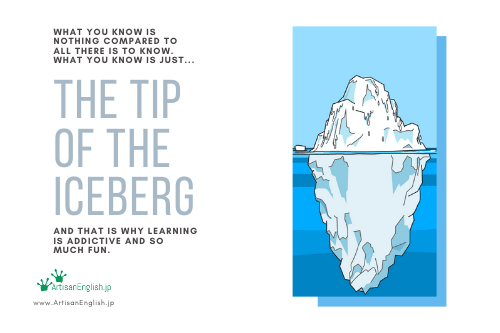
(Photo: Mote Oo Education/Pixabay | Text: David/ArtisanEnglish.jp)
YouTube / iTunes / Spotify / Radio Public / Pocket Casts / Google Podcasts / Breaker / Overcast
Listen to ArtisanEnglish.jp posts & lesson intros here.
Phrase: Tip of the Iceberg
Have you ever seen an iceberg?
Before you answer that, let me explain what I mean.
I don’t mean the slob ice or pan ice that can be observed off Hokkaido’s coast.
I mean icebergs, huge floating chunks of ice that are at least as big as a house but more often even bigger.
So, let me ask you again, have you ever seen an iceberg?
Well, I have.
In Newfoundland, May is the best month to see them floating by as they head south on the currents to melt and slowly disappear forever.
If you think icebergs are huge above the water, they are three times as big beneath the surface.
That’s where the expression the tip of the iceberg originates.
It means that what you know of an issue or situation is only just a hint of a much more complex one.
Believe me when I say icebergs can be very complicated.
If one runs aground near your community, the weather will become colder because of the wind blowing the cold air surrounding it on land.
They can also flip over very suddenly and without warning.
As a child, my dad, his best friend and I went out in a tiny fishing boat to ‘harvest’ some iceberg ice.
They wanted to put it in their whiskey.
Using an axe, they chopped off big chunks that fell into the boat.
All the while, though, they were very leery of the berg because if it happened to flip over while we were next to it, I would not be writing this today.
There you have it, another tidbit of information to add to the tip of the iceberg of what you know about me.
Flesch-Kincaid Readability Test
This post is understandable by someone with at least a 7th-grade education (age 12).
On the Flesch-Kincaid reading-ease test, this post scores 77.
The easier a passage is to read, the higher the score on a scale of 0 – 100.

